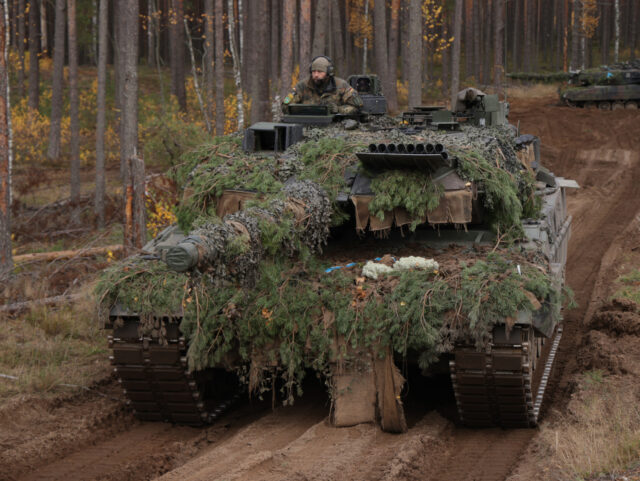The EU has reportedly set its sights on establishing a 5,000-man “rapid deployment” military force by 2025, a report has claimed.
In what appears to be the most concrete development in the EU’s desire to have its own military, lawmakers in Brussels are reportedly in the concrete planning stage for establishing a 5,000-man “rapid deployment” military intervention force, a report has claimed.
Eurofederalists across the continent have been eyeing the creation of such a force for some time, and the potential formation of a European military force was a key feature of Britain’s 2016 decision to withdraw from the European Union. When Brexit leaders like Nigel Farage warned of the hard-Eurofederalist direction of the bloc they were dismissed as believing in “a dangerous fantasy”, yet Farage is being vindicated on the point — once again.
According to a report by the German newspaper Die Welt, an agreement on the creation of the force is expected to be reached as early as Tuesday, with it set to be granted competency for “evacuation” and “stabilisation” missions.
The former of these tasks reportedly involves the escorting of civilians out of a threatened area, such as with the recent airlift of various foreign nationals and intelligence assets out of Afghanistan, while the latter involves the EU military force being deployed in a region for the purpose of securing “stability” and a short term “peace”.
With it being hinted that the force could be sent to Ukraine for the purposes of engaging in this peacekeeping function, the report indicates that such missions could constitute the force arriving in a war-torn area “heavily armed”.
Josep Borrell, the EU’s Security Policy High Representative, has said that training for the establishment of such a force could kick off as early as “the second half of 2023”, with Germany seemingly eager to be the first country to lead the intervention force once it is created.
‘Any Excuse to Grab More Power’: EU Wants a Centralised ‘Civil Protection Force’ to Fight Climate Changehttps://t.co/i6Kz3nYJqI
— Breitbart London (@BreitbartLondon) August 17, 2022
While news that the EU could soon have its own military fighting force will likely be well received by the likes of France’s Emmanuel Macron and Germany’s Olaf Scholz, other smaller EU nations — especially those that have traditionally aimed to remain militarily natural — will likely have other views.
For example, in contrast to plans aimed at harmonising the EU’s fighting capabilities, Ireland has traditionally taken a hard stance against getting involved in foreign conflicts, most notably remaining neutral during the Second World War.
While pro-globalisation politicians in the country have since taken steps to try and erode this neutrality, polling taken earlier this year found that the policy first effectively implemented by national founder Éamon De Valera remains overwhelmingly popular with the Irish people.
According to the Irish Times, two-thirds of Irish people are in favour of the island nation remaining neutral, with support for the policy being consistent across all age groups.
The plans will also hand further legitimacy to those who advocate for leaving the European Union across the continent, with the likes of arch-Brexiteer Nigel Farage long warning that senior politicians within the bloc desire the creation of an EU army.
“It wanted its own police force, it wanted its own independent foreign policy without anyone being able to veto it within the club, and it absolutely wants its own army, airforce, and navy,” Farage said last year.
“Whenever I tried to make that argument, I was shouted down. I was treated as being some sort of liar,” he continued, with one pro-EU politician having lambasted the populist as believing in a “dangerous fantasy” that the EU wants a military force during a debate a number of years before the Brexit referendum.
‘EU Absolutely Wants Its Own Army,’ Says Farage https://t.co/kNX0OIRnAp
— Breitbart London (@BreitbartLondon) September 24, 2021

COMMENTS
Please let us know if you're having issues with commenting.